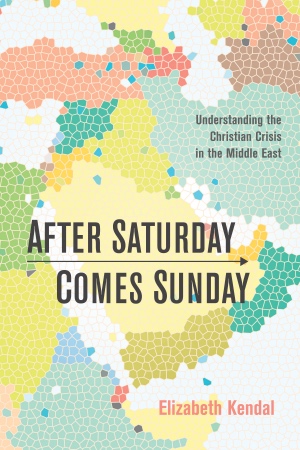
DAVID ADAMS reads Elizabeth Kendal’s detailed examination of the persecution Christians in the Middle East, After Saturday Comes Sunday…
Elizabeth Kendal
After Saturday Comes Sunday: Understanding the Christian Crisis in the Middle East
Resource Publications, Eugene, Oregon, US, 2016
ISBN-13: 978-1498239868

“Kendal provides a plethora of interesting insights into the region, past and present, and there is much in the book’s pages to inform but also to challenge and provoke the reader…”
There’s no getting around it, this is a hard read. Not just because of the subject matter but also the volume of detail into which Elizabeth Kendal, long an advocate for religious liberty internationally, goes into in seeking to help others better understand not just what’s been happening to Christian communities in the Middle East – in particular, those living in Iraq, Syria and the region known as Mesopotamia – but, perhaps more importantly, why Christians in the Middle East are facing such persecution now.
Drawing on her extensive work in the area, Kendal looks behind the headlines to the reasons underpinning the rise of groups like the so-called Islamic State and their implacable hatred of Christians – the book’s title, incidentally, refers to a “warcry” which essentially claims that after the Jews are wiped out (their day of worship being a Saturday), so too will the Christians be wiped out (their day of worship being a Sunday).
We’re now a year on from when the book is published and while events in the region have moved on from where they were last year, the reasons behind why the Middle East has seen such an upsurge of violence against Christians remain the same. This is, after all, not new phenomenon – as Kendal notes, in Iraq, for example, Assyrian Christians had begun to leave en masse from the country as far back as the first Gulf War in the early 1990s.
The issues behind the recent violence are many and complex, as Kendal points out, with the decline of Western influence (including the lack of consistency in US policy), the struggle between various powers in the Middle East for dominance and the ongoing fight between Sunni and Shi’ite Islam key along with a host of other factors – everything from increasing urbanisation and economic stress to the growth in communications technologies.
But it’s Islam and the fight within Islam that occupies much of Kendal’s text. She charts the rise of Islam since its inception, briefly canvassing key events including the Crusades, the Ottoman defeat at Vienna, and more recent events such as the Armenian Genocide of 1915 before turning to the Iranian Revolution of 1979 and lesser known events in Saudi Arabia – a siege of Mecca’s Grand Mosque and a failed Sunni revolution, the same year.
It’s then that Kendal turns to the creation of the so-called ‘Shia Crescent’ or ‘Axis of Resistance’ which, in her words, is led by the “revolutionary Shi’ite clerical regime in Iran” and “comprises governments and groups that are committed to Islamic resistance (as distinct from acquiescence)…[and] resists the state of Israel and all Western influence and interference in the Middle East” before moving on to give her perspective on the Arab Spring, the Syrian civil war and the rise of IS.
Kendal provides a plethora of interesting insights into the region, past and present, and there is much in the book’s pages to inform but also to challenge and provoke the reader, such as her view of the role of Russia in the area today.
While its tempting, given the deluge of hard stories contained in the book’s pages, to take a bleak view on the region’s future, Kendal does finish with a chapter in which she looks at some of the ways in which God has been moving in the Middle East and makes the comment that while the current crisis facing Christians in the region is not “unprecedented”, the global church’s ability to respond is (and to that end there is a helpful appendix on practical ways individuals and churches can support the persecuted).
For those who do want to get more engaged, this book is a good place to start.





